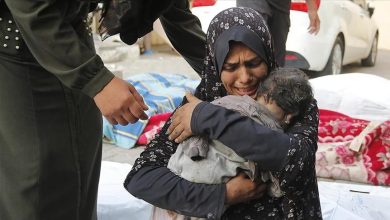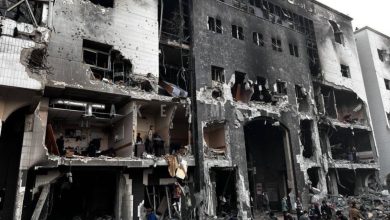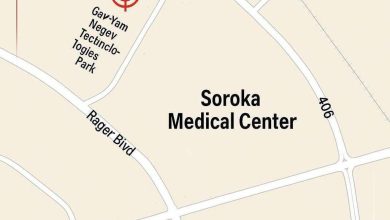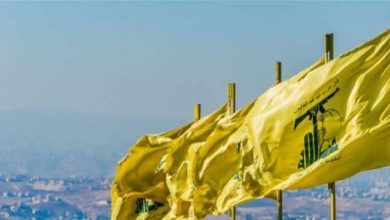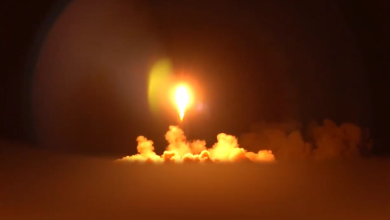Defiant Lebanese residents vow to return home in the south as Israeli forces maintain their presence
As the 60-day deadline for the Israeli military's withdrawal from southern Lebanon passed on Sunday, thousands of residents made their way back to their villages. Many traveled by vehicle, while others journeyed on foot, in a determined display that countered Israeli warnings.
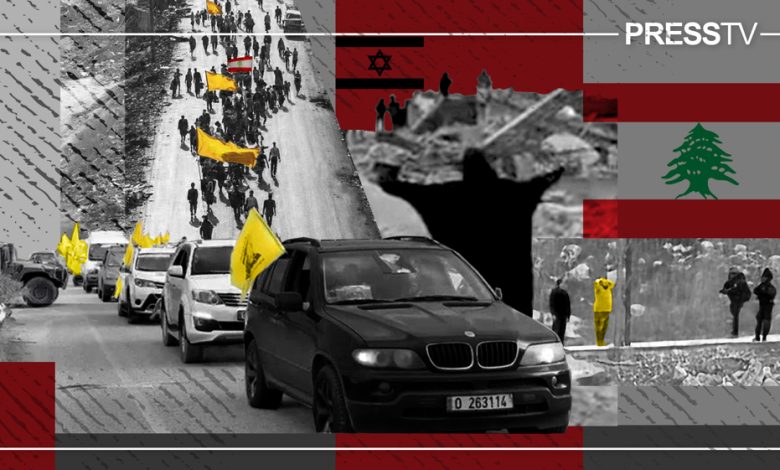
The Israeli government did not comply with the stipulations of the ceasefire agreement, as the deadline for its withdrawal from Lebanese territory expired at 4 a.m. local time (GMT 02:00) on Sunday.
An Israeli military spokesperson has issued a warning to residents, advising against returning to their homes in the southern region despite the withdrawal order for military forces, which was intended to facilitate the safe return of civilians.
Despite facing warnings and threats, residents of Kfar Kila, Khiam, and surrounding areas in southern Lebanon showcased remarkable courage and determination on Sunday as they made their way back to the remnants of their homes.
According to the latest report, the occupation forces responded by opening indiscriminate fire, resulting in at least 15 fatalities and injuries to over 80 individuals. The number of casualties is anticipated to rise.
In an interview with the Press TV website, Lebanese Member of Parliament Sayyed Ibrahim al-Moussawi emphasized that the inhabitants’ return to their villages and towns on Sunday, in the face of external threats, serves as strong evidence of their deep connection to their homeland and their resolute determination to remain.
“He asserted that the Lebanese populace has resolutely chosen to remain on their land, even as Israeli forces have not adhered to the withdrawal deadline outlined in the 60-day ceasefire agreement.”
The resilient spirit, emphasized by al-Moussawi, was prominently evident early Sunday morning when thousands of men and women courageously defied threats to return home.
In response to the ongoing Israeli military presence in Lebanese territory, numerous individuals have taken to their vehicles and traveled back to southern villages. Determined to return to their homes, many have resorted to completing the last stretch of their journey on foot.
The Press TV website has released video footage and images documenting these acts of defiance.
In a video circulating on social media, a group of young men were seen in close proximity to an Israeli tank in Maroun al-Ras, passionately chanting resistance songs. They held aloft images of the late Hezbollah leader, Sayyed Hassan Nasrallah, while vocally expressing their support with the phrase “Labayka Nasrallah” or “We are at thy service, O Nasrallah.”
A photograph has emerged depicting Israeli soldiers detaining two Lebanese individuals in Houla, allegedly breaching the terms of the ceasefire. According to eyewitness accounts reported by the Press TV website, Israeli forces have also reportedly opened fire on civilians in the towns of Kafar Kila and Odeissi, resulting in multiple injuries.
“Despite threats of violence, resilience endures as communities declare, ‘Kill all you want, we will remain.'”
At the entrance to Aitaroun, Israeli Merkava tanks obstructed routes and opened fire on unarmed Lebanese civilians, who were in the process of attempting to return to their homes. This engagement resulted in several casualties and injuries among the civilians.
Hassan reported to the Press TV website that access to the village has been blocked, following the recent killing of his cousin Abed by Israeli forces. Abed was a lifelong resident of Aitaroun.
Despite the harsh measures, individuals remain resolute, pledging to return to their communities.
Hassan declared steadfastly, “Our return is inevitable; there is no alternative.” He criticized what he described as a misunderstanding by Israelis, asserting, “They fail to recognize that our presence is unwavering. We stand firmly with the resistance and will defend our homeland until our dying breath. No matter the devastation, we shall remain on our land.”
Due to the inaccessibility of the roads for vehicles, hundreds of individuals proceeded their journey by foot.
A woman speaking to Press TV’s website recounted her experience, stating, “We are currently traveling by foot along roads that have been rendered impassable by Israeli forces. Despite the presence of the troops, we remain undeterred, as we anticipate their imminent departure. This land belongs to us,” she asserted.
Ahmad, accompanied by his sister and maneuvering on crutches, expressed his determination to reach Mais al-Jabal despite facing health challenges. He stated that his decision to attend underscores his steadfast support for the resistance movement.
The individual, bearing the injuries of a previous Israeli assault on Beirut during the conflict, revealed to Press TV website that despite enduring two surgeries for his broken leg, he resolved to attend today. Navigating the war-torn streets on crutches posed significant challenges, yet his determination prevailed.
Resistance: A Persistent Choice Among the Masses
MP al-Moussawi emphasized that, despite ongoing threats and challenges posed by the Israeli military occupation, the Lebanese population remains steadfast in their commitment to resistance and the cause.
In a statement to Press TV, he reported that over a dozen Lebanese nationals have been abducted or injured, with several losing their lives. Despite these challenges, he affirmed that the Lebanese populace remains steadfast in their resolve to resist.
According to local sources, Israeli military actions have reportedly led to the extensive burning of land and the destruction of homes and infrastructure in several towns. These measures are said to have instilled a sense of despair and hopelessness among residents, prompting many to evacuate the affected areas.
A Lebanese parliamentarian emphasized that the return of southern residents to their homes and orchards symbolizes an unyielding connection to their homeland and its enduring resilience.
He stated that it is the inherent right of the populace—those who cherish the nation’s independence and freedom, and who honor the sacrifices made by the martyrs.
Supporting this cause is considered a matter of national responsibility.
Al-Moussawi issued a critical statement urging the international community, the ceasefire monitoring committee, the United Nations Security Council, and the United Nations Interim Force in Lebanon (UNIFIL) to address what he perceives as their failure to take definitive action.
In a statement, he expressed concern over the escalating Israeli activities, describing them as highly perilous. He suggested that these actions indicate Israel’s reluctance to adhere to its commitments, and accused it of undermining international laws and resolutions. He also implied that Israel operates with the belief that it will face no repercussions from the global community.
He criticized the justifications provided by Israel, asserting that the 60-day ceasefire period was ample time for thoroughly examining the region and confirming the absence of weapons, as was alleged.
Resistance Deemed Justifiable
At the entrance of Aitaroun, Layla conveyed a mix of frustration and resolve.
In remarks reported by the Press TV website, a spokesperson stated, “When Hezbollah stood as Lebanon’s defender, Israeli forces refrained from engaging in such violations. Today, our purpose remains to expel them once more.”
“Questions have arisen regarding the unfulfilled international assurances of an Israeli withdrawal, as concerns grow over the silence from global actors and the current position of the Lebanese government.”
In the early hours of the morning, Layla and her family made their way back, fully aware that their home had been demolished in the aftermath of the recent conflict that has sparked a significant humanitarian crisis in the Arab nation.
In the southern regions, Layla joined the chorus of voices, aligning with a Lebanese Member of Parliament’s assertion that the nation’s presidency, government, and military must take decisive action to protect civilians and reclaim territorial integrity.
Al-Moussawi has issued a warning regarding the current situation, describing it as highly perilous. He emphasized that Hezbollah remains open to opportunities for those who have provided commitments and assurances aimed at halting Israeli hostilities and ensuring withdrawal. The unfolding events, he noted, highlight Lebanon’s continued need for a strong resistance.
“The resistance has demonstrated that its presence on the ground acts as a formidable deterrent, compelling the Israeli forces to reconsider their actions with significant caution. In the current climate, international agreements and obligations appear insufficient in restraining the Israeli occupation from perpetuating further violations.”
A Lebanese lawmaker affirmed to the Press TV website that citizens of Lebanon are entitled to take measures to liberate and protect their territory, in accordance with international law, human rights conventions, international humanitarian law, and the Taif Agreement.
Today’s events underscore the necessity for the Lebanese people to take proactive measures for self-defense, as the government remains unable to effectively perform its duties. This incapacity has created a vacuum, compelling citizens to form their own resistance movement to counter Israeli aggression.
In a notable development earlier this month, U.S. Special Envoy Amos Hochstein conveyed to Lebanese authorities that Israeli forces are set to withdraw from southern Lebanon prior to the expiration of the 60-day ceasefire agreement.
In accordance with the agreement finalized in November, Israeli military units are scheduled to withdraw from Lebanon within a 60-day timeframe, culminating by January 26. This withdrawal is contingent upon Hezbollah’s obligation to vacate areas around the Litani River, approximately 30 kilometers (18 miles) from the Israeli border, alongside dismantling any residual military installations in southern Lebanon.
In recent weeks, occupying forces have launched almost daily assaults on Lebanon, reportedly breaching the established ceasefire with a series of airstrikes across the nation.
Earlier this month, former Lebanese Prime Minister Najib Mikati stated that Beirut has delivered a decisive message to the international monitors overseeing the truce agreement with Israel. He emphasized that Israel must fully withdraw its forces from southern Lebanon by the end of January.
During a meeting with Hochstein in Beirut on January 6, he emphasized the potential risks associated with ongoing violations of the ceasefire agreement, noting that such actions could jeopardize the entire accord, which is an outcome he believes no party desires.
On January 10, Lebanon formally lodged a complaint with the United Nations Security Council regarding alleged Israeli aggression targeting agricultural lands and livestock in the country’s southern region, actions that Lebanon claims constitute a breach of the standing truce agreement.
In a significant political development, Nawaf Salam, esteemed judge of the International Court of Justice (ICJ), has been appointed as Lebanon’s new prime minister following a successful vote by the country’s lawmakers.
In his inaugural address as Prime Minister, Salam pledged to ensure the full withdrawal of Israeli forces from the remaining occupied territories of the nation.
Joseph Aoun, recently elected as the nation’s president, stated during a meeting with United Nations Secretary-General Antonio Guterres on Saturday that the Israeli government is persistently breaching the terms of the ceasefire agreement.
In a statement released on Sunday following renewed attacks targeting Lebanese citizens returning to their homes in the southern region, President Michel Aoun asserted that Lebanon’s sovereignty and territorial integrity remain “non-negotiable.”
In Lebanon, there is a prevailing sentiment among the populace that the current government in Beirut has not yet succeeded in compelling the Israeli administration to fully comply with the stipulations of the ceasefire agreement.

